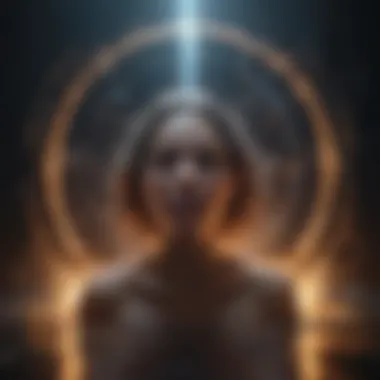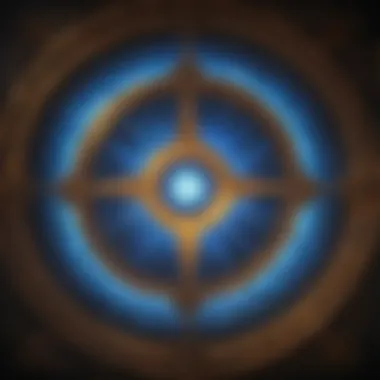Exploring Psychic Phenomena: A Comprehensive Guide


Intro
The exploration of psychic phenomena opens a multifaceted dialogue about reality and perception. Although many dismiss the idea of psychic abilities as mere folklore, the history and interpretation of these concepts tell a tale of human curiosity and belief.
From the back alleys of ancient civilizations to the grand stages of contemporary discourse, the idea that some individuals can tap into something beyond the five senses lingers in cultural narratives. This article will dissect various aspects of this intriguing subject, peeling back the layers where historical roots, cultural significance, and psychological implications intertwine.
Judging the credibility and authenticity of psychic phenomena requires us to sail the rocky seas of skepticism and belief—both essential perspectives in the ongoing investigation. As we dive deeper, we’ll find ourselves considering not only what these abilities might look like but also their relevance in modern society to both those who staunchly believe in them and those who prefer the rational view of the world.
Here, we aim to foster understanding, making sense of how practitioners interpret and navigate these experiences while reflecting on how societal beliefs frame our perceptions. Through this, we hope to embrace a broad view that engages with both tradition and modern interpretation.
Horoscope Predictions
The world of psychic phenomena often intersects with astrology, where belief systems assign much importance to the celestial bodies affecting our lives. Horoscopes serve as a bridge between the stars and personal fortunes, creating frameworks through which many individuals interpret their experiences.
Daily Horoscope
Every day, stars align in a unique configuration, guiding each zodiac sign’s path. Here’s a glimpse into what today holds for you:
- Aries (March 21 - April 19): Today, tackle challenges head-on. Your determination shines brightly, making obstacles seem merely like stepping stones.
- Taurus (April 20 - May 20): Take time for yourself; introspection will bring new ideas.
- Gemini (May 21 - June 20): Communication is key today. Share your thoughts with someone you trust.
- Cancer (June 21 - July 22): Heartstrings are tugged. Focus on emotional well-being.
- Leo (July 23 - August 22): Creativity sparks. Engage in artistic endeavors.
- Virgo (August 23 - September 22): Organization will bring peace—tidy up your space.
- Libra (September 23 - October 22): Balance is key; don’t forget to give yourself some grace today.
- Scorpio (October 23 - November 21): Your intuition is sharp; rely on it for important decisions.
- Sagittarius (November 22 - December 21): Adventure calls; dive into something new.
- Capricorn (December 22 - January 19): Hard work pays off today, leading to long-term gains.
- Aquarius (January 20 - February 18): Innovation is in the air; let your ideas breathe.
- Pisces (February 19 - March 20): Emotional connections deepen; focus on nurturing relationships.
Weekly Horoscope
As we peer into the week ahead, a few interesting highlights surface:
- Aries will face a turning point in relationships—tread carefully.
- Pisces might feel more spiritually attuned than usual; consider meditation.
- Sagittarius can expect unexpected financial news.
Monthly Horoscope
Looking at the horizon, March is a month dedicated to growth. All signs may feel an impetus to reassess their goals. Special care should be taken when communicating, as misunderstandings may arise more easily than expected.
A deeper dive into these predictions reveals how they shape expectations and thoughts, influencing personal narratives significantly. The interplay between astrological predictions and psychic principles invites us to ponder the connections and explore how they manifest in daily life.
By examining these aspects, we not only cater to the users of astrology but also enrich our understanding of the kind of psychic dynamics at play, inviting reflection on how we perceive both time and fate.
"To know oneself is to know the universe." - Ancient Wisdom
As we continue this exploration, stay tuned—there’s much more to unravel in the realm of psychic phenomena.
Defining Psychic
The term 'psychic' conjures a vast tapestry of interpretations, each laced with belief, skepticism, and myriad cultural nuances. Delving into the concept of psychic phenomena goes beyond mere definitions; it encompasses the societal, historical, and psychological underpinnings that shape our understanding. In this section, we aim to peel back the layers, exploring the significance of establishing a clear definition.
Defining what it means to be psychic is vital, as it creates a foundation upon which further discussions can be built. It helps to distinguish various forms of psychic abilities from alternative phenomena, fostering a clearer discourse. Additionally, as we delve into different cultural beliefs and practices, a well-rounded definition aids in revealing discrepancies and common threads across diverse societies.
Understanding the essence of psychic can also enrich the way practitioners approach their work. By grounding themselves in a definition that resonates with their experiences, they can better communicate their abilities and findings to those both skeptical and open to the extraordinary. Thus, dissecting this term becomes not just an academic exercise, but a practical one with far-reaching implications.
Etymology and Linguistic Origins
The word 'psychic' is steeped in history, tracing back to the Greek word 'psyche', meaning soul or mind. This historical backdrop reveals a lot about society's perception of psychic phenomena. For centuries, the concept has woven itself tightly around notions of consciousness, intuition, and the unseen forces that dictate the human experience.
When we look closely, roots of this term reflect a much broader understanding, touching on the ideas of both life and mind. In some senses, it reflects a quest to understand the core of what makes us human—our souls and the unseen connections with each other and the cosmos.
This etymological analysis offers insights into how psychic phenomena have been perceived throughout history, often viewed with a mixture of respect, fear, and fascination. It provides a crucial entry point for our exploration of how psychic capacities are considered across different cultures.
Common Interpretations in Modern Context
In today's world, the term psychic comes packed with varied interpretations, largely influenced by popular media and cultural narratives. For some, it invokes images of fortune tellers peering into crystal balls; for others, it stands for a validation of intuition and gut feelings in everyday life. More than just an umbrella term, the interpretations vary along a spectrum ranging from genuine belief in psychic abilities to outright dismissal as nonsense.


Modern interpretations can be categorized into a few core areas:
- Entertainment: Many people view psychic phenomena as a form of entertainment, associating it with shows and exhibitions that charm audiences with unexplainable tricks.
- Spiritual practices: Others might see psychics as individuals bridging the material world with spiritual realms, offering guidance and insights believed to be divinely inspired.
- Psychological phenomenon: In academic circles, the focus often shifts to psychological interpretations of such experiences. Some researchers suggest they may be rooted in cognitive biases or intrinsic human cognitive processes.
Understanding these contemporary interpretations helps contextualize the place of psychics in modern society while providing the groundwork for a deeper exploration in subsequent sections. As we progress through the article, elucidating these concepts will allow readers to engage with the topic fully, whether they approach it from a skeptical viewpoint or from an enthusiastic belief in the unseen.
Historical Perspectives
The exploration of psychic phenomena is inextricably linked with its historical journey. Throughout the ages, cultures have integrated beliefs in psychic abilities as part of their ethos, a reflection of humanity's deep-seated desire to grasp the unexplainable facets of existence. This historical background is significant as it provides context to modern interpretations, emphasizing how societal beliefs have shaped our understanding of what it means to be 'psychic.' It invites readers to appreciate that these abilities are not merely contemporary curiosities but have been a thread through the tapestry of human history, marking shifts in cultural attitudes and belief systems.
Ancient Beliefs in Psychic Abilities
In ancient civilizations, the notion of psychic abilities was often intertwined with spirituality and religion. The Egyptians, for instance, held priests in high regard, seeing them as intermediaries between the divine and the mortal realm. Heliopolitan priests practiced what we now might categorize as clairvoyance. They claimed the ability to see things happening far beyond their immediate surroundings. The Greeks also engaged with these concepts. Oracles were central figures, providing guidance and prophecies understood to be divine messages—a clear blend of spiritual and psychic practices.
"The Delphic Oracle, sitting upon the sacred tripod, was the voice that spoke divine truths, often through enigmatic riddles that defied comprehension, showcasing the intricate linkage between psychic insight and spirituality."
Moreover, in other cultures—like the Native American traditions—shamans played a significant role, with various tribes relying on these spiritual leaders for healings and insights obtained through altered states of consciousness. Such practices highlight an ancient awareness and acceptance of psychic phenomena that echoes into the contemporary era, suggesting that belief in these talents was a ubiquitous part of human experience.
Psychics in the Middle Ages
The Middle Ages marked a complex relationship between psychic phenomena and societal norms. During this period, Europe was deeply entrenched in religious doctrine. Many psychic abilities were either dismissed or demonized. Those who claimed to possess psychic gifts often found themselves under suspicion, casting a long shadow of skepticism. While on one hand, some practitioners were revered; on the other hand, accusations of witchcraft soared, leading to infamous witch hunts.
Interestingly, there were still pockets of acknowledgement. Alchemists, for example, might not have been recognized as psychics per se but engaged in practices that blurred the lines between science, spirituality, and psychic insight. Figures like Nostradamus popularized the idea of foresight, leading to a complicated legacy where psychic phenomena were both vilified and celebrated, reflecting the ambivalence of societal attitudes towards such abilities during this turbulent period.
The Enlightenment and Psychic Phenomena
The Enlightenment period sparked an intellectual awakening that significantly reshaped attitudes towards psychic phenomena. Rational thought and scientific inquiry became prized above all. Yet, paradoxically, this era birthed new interests in the mystical and the occult. Scholars began to explore psychic abilities not strictly as folklore but as subjects worthy of discussion and study.
Psychical research gained momentum with figures such as Emanuel Swedenborg and later, the rise of Spiritualism in the mid-19th century added fuel to the fire. Spiritualist mediums claimed to communicate with the dead, tapping into a collective desire to understand existence beyond physical boundaries. This period saw an intersection where the scientific method began to examine the paranormal. Prestigious societies were created to study phenomena such as telepathy and clairvoyance, revealing a dichotomy: could reason and spirit intertwine?
Through the lens of history, it is palpable how the acceptance and rejection of psychic phenomena evolved. The shifting currents of belief and skepticism have profoundly influenced contemporary practices and the dialogue surrounding psychic abilities today. Thus, understanding this historical backdrop is not only fascinating but essential for grasping the complexities inherent in the concept of psychic abilities.
Psychic Abilities Explained
Understanding psychic abilities is central to grasping the larger concept of psychic phenomena. These abilities often spark debates, intrigue, and skepticism, making them not just a topic of interest but also a reflection of human curiosity about the unseen. The importance of discussing psychic abilities lies in their cultural impact and the various interpretations across different societies. By exploring these abilities, we can appreciate their significance in spiritual practices and how they shape individual identities and worldviews.
Moreover, examining psychic abilities opens the door to discussions around intuition, perception, and the boundaries of consciousness. This article aims to demystify terms that are frequently tossed around, laying it out in clear, digestible segments.
Telepathy: The Ability to Communicate Mentally
Telepathy, often portrayed in sci-fi movies, refers to the ability to send or receive thoughts directly from one mind to another without any physical interaction. This concept raises fascinating questions about human connection and consciousness. Many believe that telepathy goes beyond mere communication; it signifies a deep empathetic bond. For example, twins often report intense experiences where they seem to know what the other is thinking or feeling, showcasing a potential form of telepathic connection.
Moreover, in modern contexts, many practitioners emphasize that telepathy can occur involuntarily, often recognized in strong emotional situations.
Research has indicated that when individuals experience heightened emotional states, such as fear or joy, they might connect at a deeper level, which could facilitate some telepathic experience. This opens the floor for discussions about the very nature of thoughts and emotions in human relationships.
Clairvoyance: Perception Beyond the Senses
Clairvoyance involves the perception of events or situations that are beyond the normal human senses. It's like having an extra pair of eyes to see what others cannot. Think of it as a sixth sense, allowing the clairvoyant to tap into energies or vibrations that an average person may overlook.
Many cultures hold beliefs that certain individuals possess clairvoyant abilities, often attributed to spiritual ancestry or rituals. These experiences can manifest as visions during meditative states or vivid dreams that later materialize in reality.
The subjective nature of clairvoyant experiences means they can vary widely among practitioners. Some may report clear visual images, while others may simply feel a sense of knowing without any clear image at all. This leads to various interpretations of what it means to truly perceive beyond the physical.
"Clairvoyance reveals an intricate dance between perception and intuition, allowing individuals to glimpse realities unseen."
Mediumship: Connecting with the Spirit World
Mediumship stands apart as it involves an individual acting as a conduit between the living and the spirit world. A medium claims to communicate with spirits who have crossed over, relaying messages or insights to those left behind. This practice draws a lot of skepticism yet continues to thrive, especially in contexts of grief and loss.


Live sessions or gatherings are famous where a medium shares messages that resonate with the audience. These connections can sometimes provide closure for individuals seeking answers or comfort. Practitioners often believe they are tapping into the vibrational frequencies of spirits—they are not just talking to ghosts but feeling and channeling their energy into tangible messages.
Precognition: Foreseeing Future Events
Precognition refers to the ability to foresee or sense events before they occur. This phenomenon often manifests as vivid dreams or strong gut feelings that something is about to happen. !Many cultures recount tales where individuals were able to predict significant events, from personal life changes to global happenings.
Some researchers suggest there might be scientific explanations for these experiences, linking them to heightened awareness of environmental cues. Others assert that precognition might be a glimpse into a future that resonates within the individual's subconscious. Jim, a regular practitioner, shared a story of how he felt a persistent dread before a friend's hospitalization, which he later saw as a precognitive experience.
Cultural Interpretations of Psychic Phenomena
Understanding the myriad cultural interpretations of psychic phenomena is vital in grasping their broader significance. This article aims to untangle the complex web of beliefs, practices, and experiences associated with the psychic realm across different cultural landscapes. Analyzing these interpretations reveals not only the similarities and differences between them but also the underlying societal values and historical contexts from which they arise. Moreover, it aids in appreciating the role psychic phenomena play in shaping individual and collective identities.
Psychics in Eastern Philosophies
In Eastern philosophies, psychic phenomena often intertwine with spiritual practices and holistic beliefs. For instance, in Hinduism, the concept of siddhis refers to supernatural abilities attained through meditation and other spiritual disciplines. These abilities can include telepathy and clairvoyance, emphasizing the belief that heightened mental states can lead to enhanced perception.
The practice of Qigong in Chinese culture illustrates another avenue where psychic abilities are revered. Practitioners believe that cultivating Qi, or life energy, through specific exercises and meditative practices can foster a deeper connection to one's environment and potentially tap into psychic-like skills. This perspective encourages individuals to see such abilities not as magical or separate from daily life but as an extension of personal growth and understanding of the universe.
Western Views on Psychic Practices
In contrast to the East, Western views on psychic practices have often been met with skepticism. Historical skepticism can be traced back to the Enlightenment, when rational thought began to overshadow mystical beliefs. Nevertheless, throughout the 19th and 20th centuries, there was a resurgence of interest in the psychic, primarily thanks to the Spiritualism movement which sought to communicate with the spirits of the deceased. This period gave rise to psychics claiming abilities to connect with those on the other side, which still has a significant following today.
Currently, in Western societies, many people approach psychic practices through a lens of therapeutic benefits, often utilizing these services to foster emotional healing or self-discovery. Tarot readings, astrology consultations, and other rituals serve not just as entertainment but as tools of introspection. They engage seekers in exploring their lives, relationships and futures, providing guidance during turbulent periods.
Indigenous Perspectives on Psychic Abilities
Indigenous cultures around the world often embody rich traditions surrounding psychic abilities, viewing them as integral to their existence rather than spectacles or mere entertainment. In many tribes, shamans or medicine people possess distinctive spiritual gifts, allowing them to communicate with their ancestors or spirits of nature. These abilities are grounded in a profound respect for the environment and a belief in the interconnectedness of all beings.
The Navajo, for example, hold that certain individuals are nez or breath-makers, who can access the spirit world and guide their communities in matters of health and protection from malevolent forces. Similarly, Australian Aboriginal cultures emphasize a deep ties to the Dreamtime – a spiritual world where ancestors and creation stories reside. This connection manifests through practices that might resemble psychic phenomena such as lucid dreaming and visions.
Overall, cultural interpretations of psychic phenomena unveil a complex mosaic of beliefs, practices, and experiences, showcasing how different societies perceive and utilize these extraordinary abilities within their contexts.
By exploring these various perspectives, we can cultivate a richer understanding of the role psychic phenomena play in diverse cultures, ultimately enriching our own insights into the nature of reality.
Skepticism and Critique
In examining psychic phenomena, skepticism and critique play a pivotal role. This section aims to unravel the layers of analysis surrounding the authenticity and interpretation of psychic experiences. Healthy skepticism goes beyond mere disbelief; it encourages a critical lens through which claims can be scrutinized. This scrutiny provides a framework for distinguishing genuine experiences from those that may be embellished or fabricated.
Scientific Examination of Psychic Phenomena
The scientific approach to psychic phenomena seeks to apply rigorous methodologies to assess claims of psychic abilities. Various studies have tried to measure and analyze purported abilities like telepathy or clairvoyance under controlled conditions.
Yet, it’s important to note that results are often inconclusive. Some researchers point to phenomena like the Ganzfeld Experiment, which aimed at testing telepathy, and had mixed results. Critics argue these results may be attributable to statistical anomalies rather than true psychic abilities. It's necessary to engage with data critically. In doing so, we can dive deeper into the underlying psychological or neurological processes that may explain such experiences.
Psychological Explanations for Psychic Experiences
Delving into the psyche reveals that many experiences labeled as 'psychic' could stem from cognitive functions. Psychological mechanisms like confirmation bias can lead individuals to interpret random events as significant or connected, fostering a belief in psychic phenomena. Moreover, the notions of pareidolia and apophenia—seeing patterns where none exist—can contribute to this feeling of psychic connection.
Additionally, the role of anxiety and stress can amplify these experiences. People often report a surge in intuition during emotionally charged moments. This phenomenon highlights how our mental state can influence perception, making it crucial to evaluate the psychological backdrop when discussing psychic experiences.
Debunking Myths: Analyzing Fraud and Misrepresentation
Throughout history, there have been countless instances of fraud in the realm of psychic phenomena. Debunking these myths is essential to separate legitimate practices from charlatanism. Many notorious figures, such as Uri Geller, gained fame through purported psychic feats, later debunked as tricks or misdirection.
A significant point to consider is that the media can distort public perception of psychic abilities, often sensationalizing these practices. This distortion leads to a misrepresentation of what is achievable through genuine psychic endeavors.
The rise of social media has further complicated this landscape. Through platforms like Facebook and forums such as Reddit, misinformation can spread rapidly, casting doubt on authentic practitioners while amplifying the influence of those who seek to deceive. Understanding these dynamics is integral to approaching psychic phenomena with a critical yet open mindset.
Healthy skepticism is not just about denying the existence of psychic phenomena; rather, it’s about seeking truth amid uncertainty.


By analyzing these various aspects—scientific testing, cognitive influences, and the impact of fraud—we not only clarify many common misconceptions but also deepen our understanding of psychic phenomena. This balanced approach allows the discerning reader to navigate through the noise and appreciate the complexities involved.
The Psychological Perspective
The significance of understanding the psychological angles of psychic phenomena cannot be understated, especially in an age where skepticism often flirts with belief. This section delves into how our minds interpret psychic events and the psychological frameworks surrounding belief in these phenomena. It examines the myriad factors that can shape a person's perception and understanding of psychic experiences, providing insight into how such beliefs can influence behavior, choices, and even societal norms.
The Psychology of Belief in Psychic Phenomena
Belief in psychic abilities is as varied as the individuals who hold them. At its core, this belief is rooted in several psychological elements. For some, personal experiences act as a catalyst. They might have had a moment where a premonition felt incredibly real, or a tarot reading seemingly hit the nail on the head. This personal connection leads individuals to seek further validation, reinforcing their belief systems.
- Cognitive Dissonance: When new evidence contradicts existing beliefs, individuals may feel discomfort. To ease this, they might rationalize or disregard contradictory facts, strengthening their belief in psychic phenomena.
- Confirmation Bias: People are naturally inclined to favor information that confirms their pre-existing beliefs. If one believes in psychic phenomena, they might focus on instances that affirm this worldview, dismissing experiences that do not.
- Cultural Background: Societies that embrace or give legitimacy to psychic phenomena often have various cultural narratives and archetypes surrounding the psychic. This collective understanding can shape individual beliefs significantly.
"What the mind can conceive and believe, it can achieve."
This famous saying highlights the role of belief in shaping our experiences.
Cognition and the Experience of Psychic Events
Cognition plays a pivotal role in how psychic phenomena are experienced and interpreted. The human brain has a knack for pattern recognition, sometimes seeing connections or meanings where none exist. This cognitive tendency can lead individuals to interpret ambiguous situations as psychic insights.
- Perception vs. Reality: The brain often builds perceptions based on sensory input. Under certain circumstances, what is perceived as a psychic event could stem from the brain's attempts to make sense of incomplete information.
- Emotional States: An individual's emotional state can color their interpretation of experiences. For instance, someone in distress may be more susceptible to interpreting events as psychic rather than coaching themselves through rational thought.
- Memory Recall: The accuracy of memory is fraught with imperfections. Recollections of psychic experiences can be altered over time, leading individuals to remember events in a way that aligns with their beliefs, regardless of the actual occurrence.
Cognitive frameworks greatly influence how individuals engage with the concept of psychic phenomena. By understanding the mind's role in belief and experience, we can foster a deeper appreciation for this intricate subject.
Modern Practices and Psychic Readings
In examining psychic phenomena in today's context, one must closely evaluate how modern practices and psychic readings play a pivotal role in shaping public understanding and perception. This section will explore not only what these practices entail but also their implications, advantages, and the ongoing adaptations in response to societal trends.
Common Practices Among Psychics Today
Psychics today demonstrate a diverse array of practices that reflect both traditional methods and innovative approaches. Some prevalent practices include:
- Tarot Reading: Many psychics use tarot cards to offer insight and guidance. Each card carries a unique meaning that contributes to the overall narrative of the reading. This method is favored for its visual and interpretive aspects.
- Astrology: By mapping celestial patterns, astrologers provide clients with forecasts based on their natal charts. This technique has become more popular thanks to technology that simplifies data calculation.
- Crystal Healing: The use of crystals is gaining traction among practitioners. Abundant in metaphysical properties, these stones are believed to harness energy conducive to healing.
- Palmistry: Reading the lines on a palm has emerged as an intimate way to assess someone's life path, personality traits, and potential futures. This ancient practice sometimes appears alongside modern methods in psychic sessions.
These practices are tailored to meet the needs of a contemporary audience, some of whom may be skeptical but still curious about psychic phenomena. There is often a blend of the old and new in these approaches, serving to bridge gaps in understanding.
The Role of Technology in Psychic Readings
The intersection of technology and psychic practices shapes new ways for both psychics and their clients to engage. Technology has spurred some significant developments:
- Online Readings: With platforms emerging, individuals no longer need to visit a psychic in person. Remote sessions via video calls are becoming increasingly common, catering to a global audience.
- Apps and Websites: A slew of mobile applications are available that provide tarot readings, astrology forecasts, and even psychic chat services. These tools put psychic insights at users' fingertips, making information more accessible.
- Social Media Influence: Platforms like Facebook and Reddit foster communities where psychics share their insights and discoveries. This not only empowers psychics to reach a wider audience but allows clients to compare experiences and delve deeper into the world of psychic practices.
Technology doesn't replace the human connection in psychic readings; instead, it enhances accessibility and streamlines processes, making it easier for everyone to connect to their spiritual paths.
These advancements present both new opportunities and challenges for practitioners. There is a fine line to walk—ensuring the authenticity of readings while embracing modern tools that resonate with the public's ever-evolving curiosities.
In sum, modern practices and psychic readings serve as a canvas for the interplay between tradition and innovation. As psychics adapt to new technological landscapes, they continue to engage individuals—whether skeptical or believing—in profound and transformative experiences.
The Future of Psychic Studies
The exploration of psychic phenomena raises questions that inspire both intrigue and skepticism. As we tread deeper into the twenty-first century, the academic study of psychic abilities is not merely a curiosity but a potential domain where new discoveries can emerge. With the evolving landscape of society’s beliefs around the metaphysical, it becomes crucial to assess how these shifts influence the future of psychic studies. These changes reflect not only advancements in technology but also a growing openness to understanding phenomena that have long been relegated to the fringes of scientific discourse.
New age psychology, neuroscience, and quantum physics are converging, creating a fertile ground for future inquiries into psychic phenomena. This intersection could provide a more nuanced understanding of how humans perceive reality and what roles consciousness and intention play within that framework.
Emerging Trends in Psychic Research
Recent studies indicate a burgeoning interest in rigorous methodologies applied to previously anecdotal evidence. Some trends worth noting include:
- Neuroscience and Consciousness: As brain imaging techniques advance, researchers are scrutinizing the neural correlates of psychic experiences. This can uncover how certain brain states may accompany psychic abilities, leading to a clearer understanding of the mind-body connection.
- Parapsychology Initiatives: The work of organizations like the Parapsychology Association highlights a resurgence in academic scrutiny of psychic claims. Scholars are collaborating on experiments that bring together skeptics and believers alike, fostering an environment for critical examination.
- Cultural Studies: The rise of multicultural perspectives in psychic research investigates how different belief systems interpret similar psychic phenomena. Understanding these cultural lenses can shed light on the varying acceptance of psychic practices globally.
Each of these trends signals a shift in how psychic phenomena are perceived—and perhaps more importantly, they offer pathways for legitimizing psychic studies within scientific frameworks.
Integrating Psychic Studies with Mainstream Science
The possibility of integrating psychic studies with mainstream science rests on several crucial considerations:
- Methodological Rigour: Establishing a scientific methodology to evaluate psychic claims can enhance credibility. This could involve double-blind studies that test the efficacy of psychic practices like tarot readings or mediumship.
- Interdisciplinary Collaboration: Collaborating with experts from neuroscience, psychology, and anthropology can pave the way for insightful research. By leveraging different areas of expertise, researchers can construct a holistic view of psychic phenomena.
- Educational Outreach: Promoting knowledge about psychic phenomena in academic settings encourages critical thought and discussion. Introducing workshops and courses that blend scientific inquiry with metaphysical understanding may inspire a new generation of researchers.







